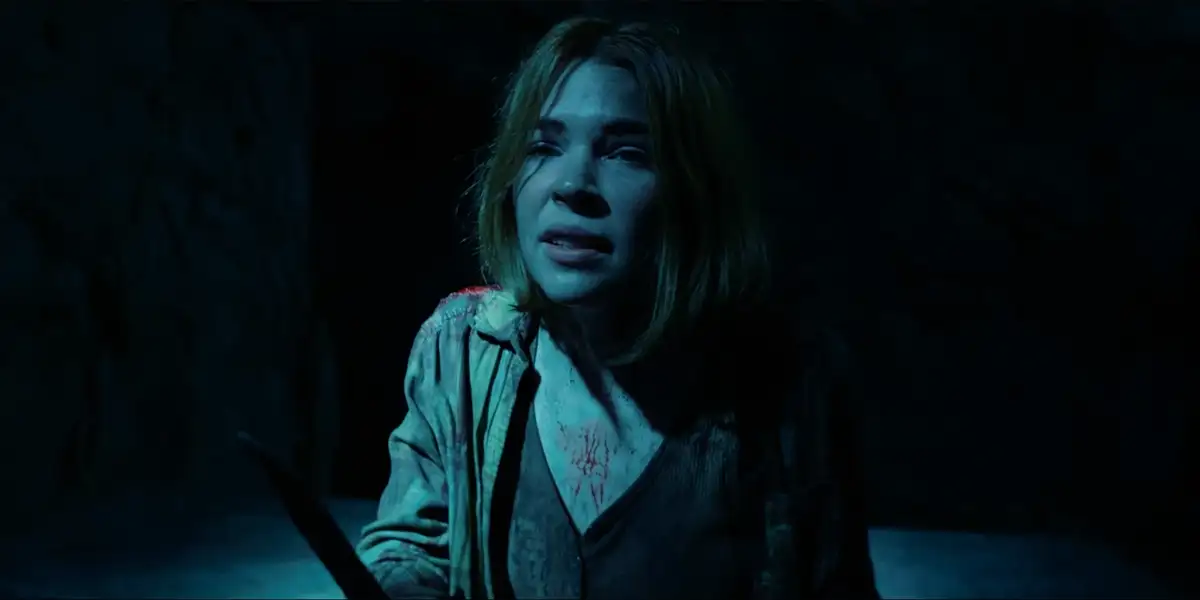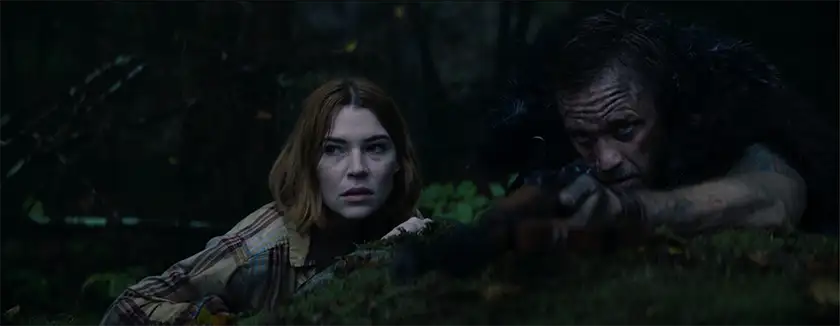Movie Reviews
Consumed Movie Review: Woodland Chills

Mitchell Altieri’s Consumed has some strong performances, but a weak narrative and undercooked ideas bring everything down.
Director: Mitchell Altieri
Genre: Horror
Run Time: 89′
US Release: August 16, 2024 in select US theaters
UK Release: TBA
After watching Mitchell Altieri’s Consumed, I think I’m going to take a break from horror films that take place entirely in the woods. Some in the genre use the setting well, with The Blair Witch Project being a particularly terrifying example, but for the most part, these woodland set horror pictures don’t do enough to stand out.
Sure, there’s not a lot you can particularly do when all you have surrounding you are trees, but man, it’s just hard to muster up any interest in what ultimately amounts to a whole lot of standing around waiting for something scary to happen.
Now, horror movies, especially independent ones, often have only a tiny budget to work with, which can only add to the stresses of production. Consumed, from the jump, is a simple film. We follow a couple named Beth (Courtney Halverson, of True Detective) and Jay (Mark Famiglietti) as they take on a camping trip just one year after Beth’s cancer remission. Their little vacation starts well enough, but it doesn’t take long before the woods they reside in begin to show their dark side. As a mysterious skin-wearing creature hunts the couple down, they are saved by Quinn (Devon Sawa), a mysterious hunter living in the woods. Caught between this strange beast and a potentially dangerous man, Beth and Jay find themselves trapped in a horrifying nightmare and must make major sacrifices to escape.
When you’re someone who has watched a lot of horror films, it becomes very easy to spot all the clichés and contrivances that come with the genre. Sometimes, these can be used in charming ways, but other times, they serve to distract and overwhelm you in mediocrity. With Consumed, the set-up is compelling enough, but the execution leaves much to be desired. Whether it’s the budget or the general lack of creativity in the script that brings things down, the result is a movie that can’t stand out from the crowd. Every cliché and moment you’ve seen in horror films like this is hit here with no real fanfare. Budget constraints or not, the general lack of fresh ideas is where Consumed truly crumbles.

The relationship between Beth and Jay is undoubtedly the heart of Consumed, but at the same time, the script by writer David Calbert fails to drive home the emotionality of their situation. Beth is a character who’s deeply impacted by her illness and, despite seemingly beating it, finds herself distracted by something on her mind. Jay, on the other hand, finds his optimism for the future clashing with the trauma of the past.
These struggles the characters face largely get tossed to one side when the film’s horror elements begin to kick in, and frankly, it’s a real shame. Courtney Halverson and Mark Famiglietti are both strong performers, gathering a lot of emotion and heart purely through their confident performances. With the meagre budget on hand, it’s incredibly frustrating that Consumed seems to focus on the wrong things. When you add some cheap-looking CGI into the mix, many of the creepier moments fail to resonate. There’s occasional fun to be had in the film’s use of gore and practical effects, but it ultimately feels empty and underdeveloped.
In the third act of Consumed, there is an attempt to try and wrap its emotional core around its character once more to create a more impactful ending, but it comes a little too late. Despite reaching only 90 minutes, including credits, the film still feels a bit long in the tooth and aimless in what it has to say or what it wants to show on screen. Is it a story about overcoming the trauma of illness, or is it a story about this couple coming together to escape a terrifying skin-wearing monster and ultimately growing stronger together in the process? Consumed attempts to explore these concepts, but it ultimately reaches an unsure answer. Instead, it opts to do both things simultaneously with mixed results.
Consumed is far from a bad horror movie. The performances are strong, and there’s at least some fun to be had in its regular genre thrills. However, it is a case of unrealised potential, as director Mitchell Altieri and writer David Calbert ultimately feel too interested in the things they just don’t have the right script or budget for. The film plays around with some fun and more existential ideas in the third act, but it all arrives a little too late, leaving everything feeling undercooked. Some solid ideas throughout show that both Altieri and Calbert have engaging, creative minds, but it’s all ultimately wrapped around a story that is simply too shallow to hit as hard as it should.
Consumed will be released in US theaters and on demand on August 16, 2024.

Movie Reviews
Rex Reed’s 2024 Movie Review Roundup: A Masterclass in Blistering Honesty

Rex Reed’s scalpel was particularly sharp in 2024, slicing through 43 films with the kind of ruthless precision only he can wield. This was the year he likened Mean Girls to “cinematic Covid,” torched Longlegs as a “dumpster fire,” and suggested that Cash Out had John Travolta so lost, “somebody stage an intervention.” For those seeking unfiltered truths about Hollywood’s latest offerings, Reed delivered—though not without a handful of pleasant surprises.
His ratings reveal a critic tough to impress: 28 percent of films earned 1 star, while 5 percent received the graveyard of zero stars. Horror films bore the brunt of his wrath—Longlegs and Heretic were sacrificed at the altar of his biting prose. Yet, amid the wreckage, 5 percent clawed their way to 4 stars, with dramas like One Life and Cabrini standing out for their emotional gravitas. Biopics, historical narratives and character studies fared best under his gaze, suggesting Reed still has a soft spot for films anchored in strong performances and rich storytelling.
One of the more controversial reviews? Reed’s glowing praise for Coup de Chance, which he called “Woody Allen’s best film in years.” In an industry where few dare applaud Allen publicly, Reed’s unapologetic endorsement (“unfairly derailed by obvious, headline-demanding personal problems”) was as bold as ever. Interestingly, the most-read review wasn’t the most positive—The Last Showgirl dazzled readers, perhaps more for the spectacle of Pamela Anderson’s Vegas reinvention than the film’s plot. It seems Reed’s audience enjoys his kinder takes, but they revel in his cinematic eviscerations just as much. When Reed loves a film, he ensures you know it—just as he ensures the worst offenders are left gasping for air.
Movie Reviews
Movie Review: A Locksmith lives to Regret Taking that One “Night Call”

I’m of two minds about that subgenre we call the hero/heroine with “particular skills” thriller.
The parade of Liam Neeson/Jason Statham/John Cena et al action pictures where this mobster, that rogue government or rogue government agency or creepy neighbor crosses this or that mild-mannered man or woman who turns out to be ex-CIA, a retired Marine, a former assassin or Navy SEAL has worn out its welcome.
Somebody effs around, somebody finds out they’ve “Taken” the wrong relative, crossed the wrong professional mayhem-maker. Yawn.
It’s always more interesting when somebody a lot more ordinary is tested by an extraordinary situation, and by people ostensibly a lot more capable of what Mr. or Ms. In Over Their Heads is attempting. “Three Days of the Condor” is the template for this sort of film. A more recent example is the snowplow operator tracking down and avenging himself on his son’s mob killers — “In Order of Disappearance.”
Throwing somebody with one “particular skill” that doesn’t include violence, criminal or espionage subterfuge or the like? As an exercise in screenwriting problem-solving that’s almost always a fun film to watch. That’s why I have high hopes for Rami Malek’s upcoming spring fling, “The Amateur.”
Let’s hope that’s as good as the lurid, violent and tight-as-a-drum Belgian thriller, “Night Call.” A young man (Jonathan Feltre) is tricked, trapped and life-or-death tested by one long night at work.
Mady is a student, we gather, and a native-born Belgian with a thing for Petula Clark ’60s pop — in French. His night gig is as a locksmith. On this one night, that job will get him into trouble despite his best efforts to avoid it. And his “particular skills” and the tools of his trade will come in handy just enough to make you mutter, “clever, clever boy” at the screen and what writer-diector Michiel Blanchart has cooked-up for his feature filmmaking debut.
Mady’s the guy you summon when you’ve locked yourself out of your car, business or flat in the wee hours. He’s professional, courteous and honest. No, the quoted price — 250 Euros — is all you owe.
He’s also careful. The young woman named Claire (Natacha Krief) summons him to a Brussels flat she’s locked out of. She doesn’t have the €250. It’s in her purse, in her flat. With her keys. No, that’s where her ID is, too. As she’s flirted, just a bit, and the streets all around them are consumed by Black Lives Matter protests because Black people die at the hands of white cops in Belgium, too, he takes her word for it.
Mady might be the last to figure out that her last lie, about “taking out the trash” (in French with English subtitles) and hitting the ATM downstairs, is her get-away. When she rings him up and warns him to “Get OUT of there” (in French with subtitles) he’s still slow on the uptake.
That’s when the apartment’s real resident, a musclehead with a punching bag and lots of Nazi paraphrenalia on the walls, shows up and tries to beat Mady to death. He fails.
But can a young Black man call the possibly racist cops about what’s happened and have them believe him? Maybe not. It’s when he’s trying to “clean” the scene of the “crime” that he’s nabbed, and his night of hell escalates into torture, threats and attempts to escape from the mobster (Romain Duris at his most sadistic) in pursuit of stolen loot and the “real” thief, the elusive but somehow conscience-stricken “Claire.”
As Hitchcock always said, “Good villains make good thrillers.” Duris, recently seen in the French “The Three Musketeers” and “The Animal Kingdom,” famous for “The Spanish Apartment” and “Chinese Puzzle,”, is the classic thriller “reasonable man” heavy.
“Either you become a friend, or a problem,” his Yannick purrs, in between pulling the garbage bag off the suffocating kids’ head, only to wrap Mady’s face in duct tape, a more creative bit of asphyxiation.
The spice that Blanchart seasons his thriller with is the backdrop — street protests, with Black protesters furious that Mady isn’t joining them and riot police pummeling and arresting every Black face in sight. That’s jarringly contrasted by the oasis-of-calm subway and unconcerned discos where Mady chases clues and Claire.
A getaway on a stolen bicycle, dashing through streets and down into a subway station, suspense via frantic escapes, frantic bits of outwitting or outfighting crooks and cops, a decent confrontation with the not-cute-enough-to-excuse-all-this Claire and a satisfying “ticking clock” finale?
That’s what makes a good thriller. And if those “particular skills” show up here and there, at least we know Mady’s learned something on a job that if he lives to finish school, won’t be his career.
Rating: unrated, graphic violence, sex scenes in a brothel
Cast: Jonathan Feltre, Natacha Krief, Jonas Bloquet, Thomas Mustin and Romain Duris.
Credits: Scripted and directed by Michiel Blanchart. A Magnet release.
Running time: 1:37
Movie Reviews
'Cunk on Life' movie review: Laugh-out-loud mockumentary on life’s big questions

‘Cunk on Earth’ (2023), a mockumentary series on BBC, was hailed for its laugh-aloud mockery of pretentious documentaries and Morgan’s razor-sharp comedic timing — British droll at its very best.
-

 Health1 week ago
Health1 week agoNew Year life lessons from country star: 'Never forget where you came from'
-
/cdn.vox-cdn.com/uploads/chorus_asset/file/24982514/Quest_3_dock.jpg)
/cdn.vox-cdn.com/uploads/chorus_asset/file/24982514/Quest_3_dock.jpg) Technology1 week ago
Technology1 week agoMeta’s ‘software update issue’ has been breaking Quest headsets for weeks
-

 Business4 days ago
Business4 days agoThese are the top 7 issues facing the struggling restaurant industry in 2025
-

 Politics1 week ago
Politics1 week ago'Politics is bad for business.' Why Disney's Bob Iger is trying to avoid hot buttons
-

 Culture4 days ago
Culture4 days agoThe 25 worst losses in college football history, including Baylor’s 2024 entry at Colorado
-

 Sports3 days ago
Sports3 days agoThe top out-of-contract players available as free transfers: Kimmich, De Bruyne, Van Dijk…
-

 Politics2 days ago
Politics2 days agoNew Orleans attacker had 'remote detonator' for explosives in French Quarter, Biden says
-

 Politics2 days ago
Politics2 days agoCarter's judicial picks reshaped the federal bench across the country














